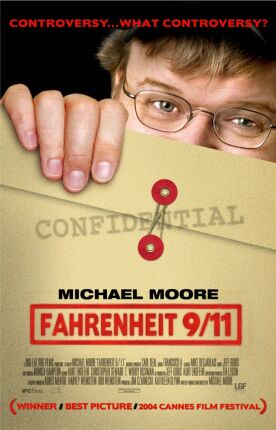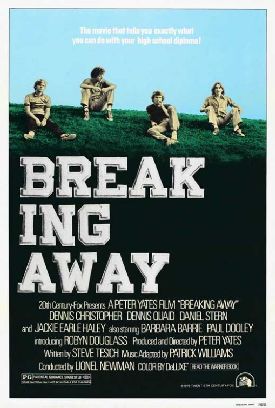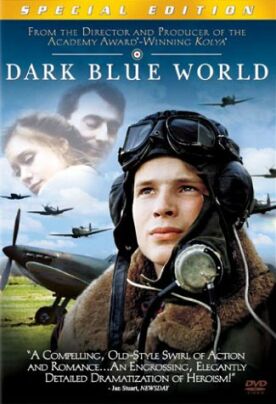Fahrenheit 9/11
It is not quite clear, going into it, why Michael Moore should have chosen to take off Ray Bradbury’s title — Fahrenheit 451 — of a story about book-burning in order to make what seems an even feebler joke than usual in the title of his anti-Bush screed, Fahrenheit 9/11. Indeed, in one of the film’s already-famous scenes, President Bush is shown reading a book — My Pet Goat — to some school-children in Florida immediately after being informed of the 9/11 attacks. But if Mr Moore doesn’t seriously try to pin the rap of being a book-burner on the President, it is one of the few crimes or derelictions of duty committable by men in power that he doesn’t charge him with. Bradbury’s dystopia, otherwise unmentioned, looks forward to Orwell’s in 1984, from which the filmmaker reads in closing. He means to suggest that George Bush’s America is at least a stage on the way to, if not yet a perfect copy of, Big Brother’s Oceania.
A little over the top? You or I might think so, but Michael Moore was born over the top. In fact, the only top he’s ever been under is the Big Top, and his new film is every bit the circus that Bowling for Columbine or Roger and Me was. These are movies to pump up the faithful, not to persuade the wavering, to feed the prejudices of the haters, not to impress the genuinely open-minded. As a skeptic about the war in Iraq — and one with a son quite likely to be sent there — I was most disappointed with the quality of the polemic in Fahrenheit 9/11, which begins with election night 2000 and every loony leftie’s favorite conspiracy theory before September 11th, namely that of the “stolen” election.
Now if I were to offer just one piece of advice to Mr Moore it would be that he could strengthen, not weaken his case by a diminution of the number of faults he has to lay at the President’s door. Say he did steal the election. Wouldn’t it be better to let that one slide if your real object is to demonstrate that he also went to war in order to line his own pockets and those of his buddies? Doesn’t the unified field theory of presidential wrong-doing carry just a tiny bit less conviction than a tightly-argued case against one or two misdeeds? Can we really stay angry about a war fought for — allegedly — nothing while we’re laughing at John Ashcroft for singing a corny song of his own composition? Or maybe he doesn’t really care if we stay angry, or focused on actual misdeeds, so long as he can get a laugh out of audiences smug in their sense of effortless superiority to the President and his administration?
One thing that is clear is that Michael Moore is a stranger to all forms of restraint, and that he is able to find anti-Bush material in just about anything. To him, the president is guilty both of stupidity and of diabolical cunning, of laziness and of leading the march to totalitarianism, of cowardice and of insouciance under pressure in that Florida classroom — Goat-gate, as perhaps we ought to call it — of fear-mongering in order to sell the war and of neglecting warnings of terrorist activity, of over-zealousness about security and of laxness about security. Not only is he guilty of all these things, his whole family is. So are his friends. So is his administration. As he has done in his other films, Mr Moore stalks his subjects when he can and digs up out-takes from television appearances when he cannot. The funniest of these comes right at the beginning of the movie, when Paul Wolfowitz is shown spitting on a comb before running it through his hair in preparation for a television interview.
What kind of monster is this? The scene is only the prelude to shot after shot over the opening credits of the administration’s rogues’ gallery being made up for TV appearances — Cheney, Rumsfeld, Powell, Ashcroft, Condoleezza Rice and, of course, Bush himself. Admittedly, some people do find this funny, but don’t even good presidents wear make-up on TV? Does anyone seriously believe that make-up implies phoniness? I suppose that could explain Mr Moore’s own slovenly, shambling appearance. Even so, it is hard to imagine anything phonier than making a case against the war which never engages with a single serious argument in favor it it — apart from, inevitably, the familiar Weapons of Mass Destruction.
That one is of course taken care of in advance by the film’s demonization of Bush. Anyone as wicked as he would obviously not hesitate to lie about the WMD even if he knew they did not exist. And so the charge that he did know is suggested without ever being made. Every other aspect of the case against Saddam Hussein is forgotten in the depiction of happy, smiling Iraqis whose little paradise only came to an end with the dropping of American bombs. Both here and in his presentation of the bereaved mother of an American soldier killed in Iraq, whose grief Moore milks for all it is worth, he is at his most unconscionable. In wars people die and are horribly injured. The fact ought to make us hesitate and hesitate again ever to go to war, but it is not in itself an argument for or against war’s necessity — except for those whose minds are already made up.
Discover more from James Bowman
Subscribe to get the latest posts to your email.







